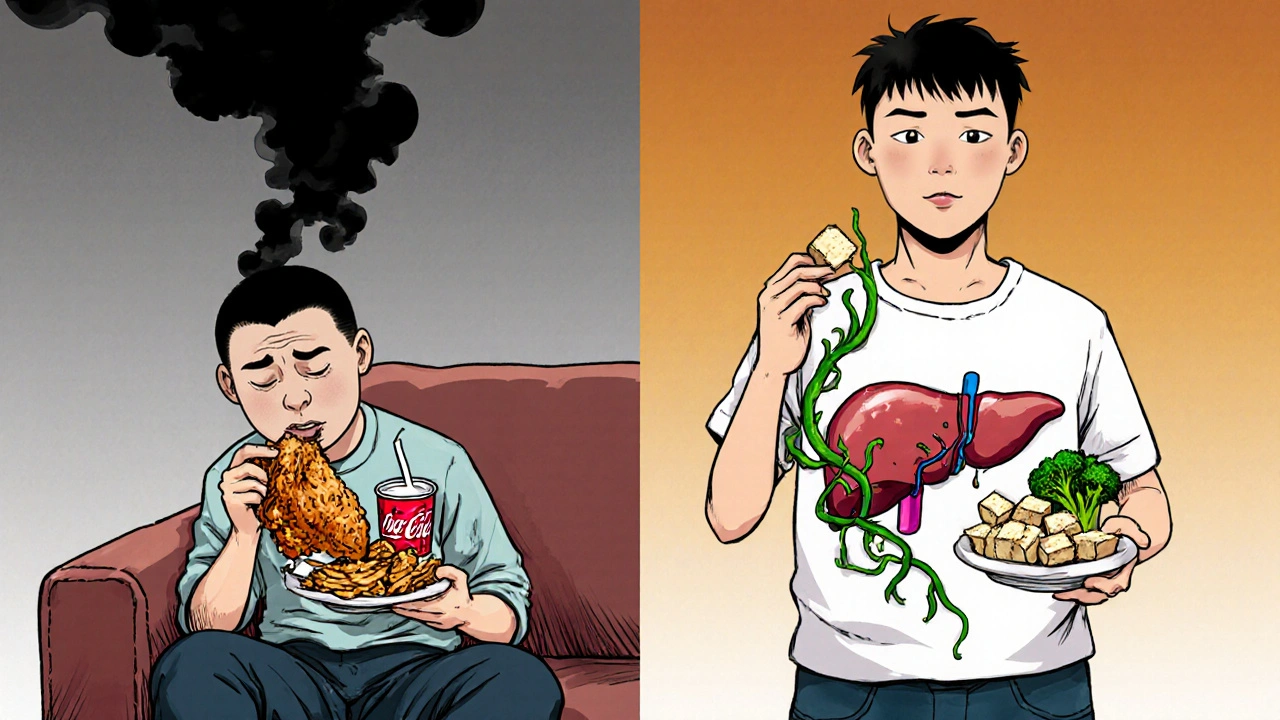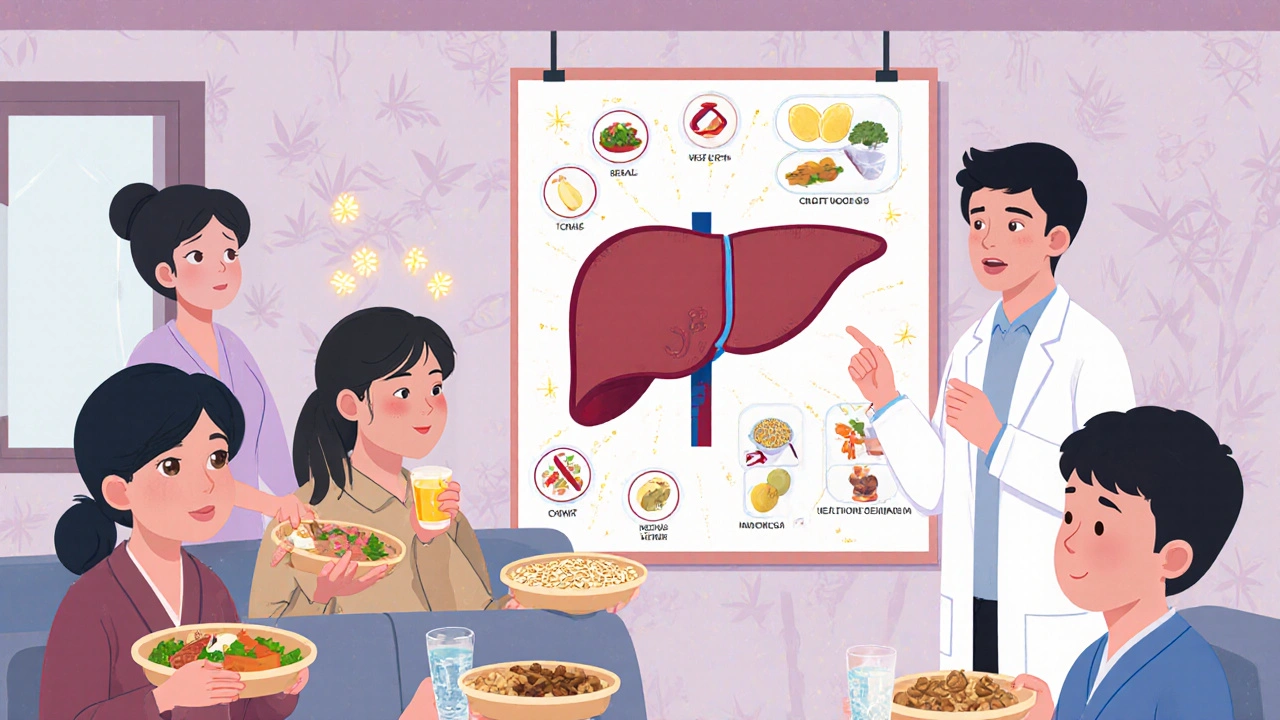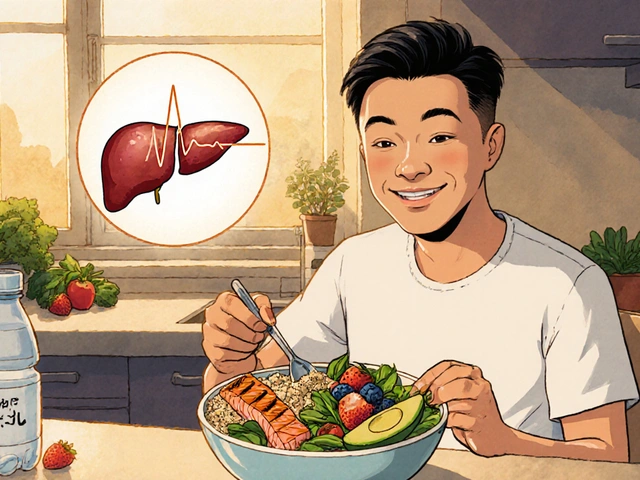When you're taking velpatasvir - usually as part of a combo pill like Epclusa - your body is fighting a serious infection: hepatitis C. This medicine works hard to clear the virus from your liver. But what you eat can make a big difference in how well it works and how you feel during treatment.
Why Diet Matters With Velpatasvir
Velpatasvir isn't broken down by your liver the same way as older hepatitis C drugs. That means fewer food restrictions than you might expect. But that doesn’t mean food doesn’t matter. Your liver is already under stress from the virus. Eating the wrong things can slow healing, make side effects worse, or even raise your risk of liver damage.
Studies show that people who eat balanced, nutrient-rich meals during treatment recover faster and report fewer symptoms like fatigue and nausea. On the flip side, those who rely on processed snacks, sugary drinks, or heavy fried foods often feel worse and take longer to see results.
What to Eat: Fuel Your Liver for Healing
Your goal is simple: reduce inflammation, support liver repair, and keep your energy up. Here’s what works:
- Leafy greens - spinach, kale, Swiss chard. They’re packed with antioxidants that help your liver detox naturally.
- Cruciferous vegetables - broccoli, cauliflower, Brussels sprouts. These contain compounds that boost liver enzyme activity.
- Lean proteins - chicken, turkey, fish (especially salmon and sardines), tofu, eggs. Protein helps rebuild liver cells without overloading them.
- Whole grains - oats, brown rice, quinoa, whole wheat bread. They stabilize blood sugar and prevent energy crashes.
- Healthy fats - avocados, olive oil, nuts, seeds. These reduce inflammation better than any supplement.
- Fruits - berries, apples, citrus, pears. High in fiber and vitamin C, they support immune function.
- Water - aim for 2 to 3 liters a day. Hydration helps flush out toxins and keeps your digestion smooth.
One patient in a 2024 UK liver clinic study said switching to this kind of diet cut her fatigue by 60% in just three weeks. She didn’t change her meds - just her meals.
What to Avoid: Hidden Traps That Hurt Your Liver
Some foods don’t directly interfere with velpatasvir, but they make your liver work harder - and that’s the last thing you need.
- Alcohol - zero tolerance. Even one drink can cause serious liver damage while you’re on treatment. This isn’t a suggestion - it’s a medical rule.
- Processed meats - bacon, sausages, deli meats. They’re loaded with nitrates and salt, both of which increase inflammation and fluid retention.
- Sugary drinks and snacks - soda, candy, pastries. Sugar turns into fat in the liver, worsening fatty liver disease, which many hepatitis C patients already have.
- High-sodium foods - canned soups, frozen meals, soy sauce, pickles. Too much salt leads to bloating and fluid buildup, especially if your liver is struggling.
- Fried and greasy foods - fries, fried chicken, onion rings. These are hard to digest and trigger nausea, a common side effect of velpatasvir.
- Herbal supplements - milk thistle, kava, green tea extract. Even natural products can interfere with liver metabolism. Talk to your doctor before taking anything extra.
One man in Nottingham stopped eating his daily takeaway curry during treatment. Within two weeks, his bloating and nausea disappeared. He didn’t realize how much salt and oil were adding stress to his liver.

Timing Your Meals With Velpatasvir
You can take velpatasvir with or without food - that’s one advantage over older drugs. But timing your meals can help manage side effects.
If you get nauseous after taking your pill, try eating a small, bland snack like toast or rice crackers 20 minutes before. Avoid heavy meals right before or after. A light meal with protein and complex carbs - like yogurt with oats - works best.
Don’t skip meals. Low blood sugar makes fatigue worse. Eat every 3 to 4 hours if you can. Snack on nuts, fruit, or hard-boiled eggs between meals.
Supplements and Vitamins: Safe or Risky?
Most people don’t need extra supplements. But if your doctor says you’re low on certain nutrients, here’s what’s generally safe:
- Vitamin D - many people with hepatitis C are deficient. A daily 10mcg dose is usually fine.
- B-complex vitamins - support energy and nerve function. Avoid high-dose B3 (niacin) unless prescribed.
- Magnesium - helps with muscle cramps and sleep. Food sources like almonds and spinach are best.
Stay away from high-dose vitamin A, iron supplements, and any liver "detox" products. They can overload your liver when it’s trying to heal.

Real-Life Tips From People Who’ve Done It
Here’s what worked for real patients in UK clinics:
- Meal prep Sundays - cook a big batch of quinoa, grilled chicken, and roasted veggies. Portion it out for the week. No last-minute junk food.
- Swap soda for sparkling water with lemon - cuts sugar and helps with bloating.
- Keep a food journal - write down what you eat and how you feel. You’ll spot patterns fast.
- Use herbs instead of salt - rosemary, turmeric, garlic, and ginger add flavor without the sodium.
One woman in Leeds said she started drinking ginger tea in the morning. It cut her morning nausea so much she could finally eat breakfast without feeling sick.
What If You Slip Up?
Life happens. You might eat a pizza, have a glass of wine, or skip a meal. Don’t panic. One mistake won’t ruin your treatment.
Just get back on track the next day. Focus on hydration and eating clean for the next 24 hours. Your liver is resilient - especially when you give it support.
But if you regularly eat fried food, drink alcohol, or skip meals, talk to your doctor. They can connect you with a dietitian who specializes in liver health.
When to Call Your Doctor
Most side effects of velpatasvir are mild - headache, fatigue, nausea. But if you notice any of these, call your clinic:
- Dark urine or pale stools
- Yellowing of skin or eyes (jaundice)
- Severe abdominal pain
- Swelling in legs or belly
- Confusion or trouble thinking clearly
These could signal liver stress. Don’t wait. Get checked.
Can I drink coffee while taking velpatasvir?
Yes, in moderation. One or two cups of black coffee a day are fine and may even help your liver. Avoid sugary lattes or creamers. Coffee has antioxidants that may reduce liver inflammation. But if you get jittery or have trouble sleeping, cut back.
Does velpatasvir cause weight gain?
Not directly. But some people gain weight because they feel better and eat more - especially if they were losing appetite before treatment. Others gain due to fluid retention from liver stress. Focus on whole foods, not calories. Weight changes usually even out after treatment ends.
Can I take velpatasvir with other medications?
Some medicines can interact with velpatasvir. Avoid certain statins, seizure drugs, and HIV meds without checking with your doctor. Always tell your pharmacist you’re on velpatasvir before picking up any new prescription or over-the-counter pill.
How long after treatment should I keep eating healthy?
Forever. Even after the virus is gone, your liver still needs care. Many people develop fatty liver or other issues after hepatitis C. Eating well, staying active, and avoiding alcohol are the best ways to protect your liver long-term.
Is it safe to exercise during treatment?
Yes - and it helps. Light to moderate exercise like walking, yoga, or swimming reduces fatigue and improves mood. Don’t push yourself if you’re exhausted. Listen to your body. Even 20 minutes a day makes a difference.
Healing your liver isn’t just about the medicine. It’s about what you put on your plate every day. Velpatasvir gives you a powerful tool - but your diet is the foundation. Eat smart, stay hydrated, and your body will do the rest.


Tanuja Santhanakrishnan
Just finished my 12-week course of Epclusa and I can't believe how much better I feel! I swapped soda for sparkling water with lemon, started meal prepping Sundays, and honestly? My energy went from 'nap at 3pm' to 'hiking on weekends'. No magic pills - just real food. My liver thank you notes are written in kale and salmon. 🌱🐟
Cecil Mays
YES! This is the exact advice I needed 😊 I was eating pizza every Friday like it was a ritual - now I do grilled chicken + roasted veggies and I actually look forward to breakfast for the first time in years. You're not just treating hepatitis C - you're reclaiming your life. Keep going!! 💪
Stuart Palley
So you're telling me I can't have my daily greasy burrito and still be healthy? What even is life anymore. I mean I get it but come on. My liver's been through worse than a little grease. I'm not a lab rat
Emil Tompkins
Yeah right and next they'll tell us the sun is bad for our liver too. They're just trying to sell you organic kale and $20 herbal teas. Velpatasvir works whether you eat tofu or Taco Bell. The real enemy is Big Pharma pushing 'diet compliance' so you keep buying their overpriced pills
Sarah Schmidt
There's a deeper truth here that most miss - healing isn't about food. It's about surrender. The liver doesn't care if you eat quinoa or not. It cares if you stop fighting your own body. The diet advice is just the surface layer of a much larger spiritual recalibration. You're not treating hepatitis C - you're confronting the toxicity of modern life. And that's terrifying.
Glenda Walsh
Wait wait wait - did you say NO ALCOHOL?!?!? Even one sip?!?!? I mean I know it's bad but like... what if it's just a tiny glass of wine with dinner? Like... just one? I mean I've read studies - maybe it's fine? I'm not sure I can do this…
Lorena Cabal Lopez
My liver doesn't care what you eat. You're wasting your time.
Gary Fitsimmons
I was skeptical too but I followed this list and I swear I slept better in week 2 than I had in years. No fancy stuff - just more water, less salt, and a walk after dinner. My doctor said my liver enzymes dropped like a rock. You don't need to be perfect. Just try.
Karen Werling
My grandma used to say 'food is medicine' - turns out she was right. I started drinking ginger tea every morning after reading this and my nausea? Gone. No more vomiting before work. Just a warm cup, a deep breath, and I’m ready. Small things matter. 💛
Billy Gambino
The ontological framework of hepatic regeneration is predicated not on macronutrient composition per se, but on the epistemic alignment of metabolic homeostasis with circadian rhythm modulation. The consumption of cruciferous vegetables induces phase II detoxification enzyme upregulation via Nrf2 pathway activation - a molecular cascade that cannot be replicated by pharmacological intervention alone. Ergo, dietary adherence is not adjunctive - it is constitutive to therapeutic efficacy.
Raj Modi
While the dietary recommendations presented are scientifically sound and supported by multiple clinical studies including the 2024 UK liver clinic data referenced, I would like to emphasize that individual metabolic variability must be taken into account. For instance, patients with comorbid type 2 diabetes may require stricter glycemic control, whereas those with renal impairment may need to moderate potassium intake from leafy greens. A personalized nutrition plan developed in collaboration with a registered dietitian specializing in hepatology is strongly advised to optimize outcomes.
Kevin Stone
Everyone here acts like this is some miracle diet. You think your kale smoothie is going to fix years of damage? Newsflash - if you didn’t take care of yourself before, you won’t magically fix it now. This is just guilt-tripping disguised as advice.
Natalie Eippert
Why are we letting corporations dictate what we eat? This is just another way to control the population. Real Americans eat meat and potatoes. This whole 'healing liver' thing sounds like woke propaganda pushed by Silicon Valley nutritionists.
kendall miles
Did you know the FDA suppresses liver healing research because it threatens pharmaceutical profits? I’ve seen the documents. Velpatasvir is just a cover. The real cure is magnesium chloride and infrared saunas. Nobody wants you to know this. They’re scared.
STEVEN SHELLEY
THIS IS A SCAM. VELPATASVIR IS MADE BY BIG PHARMA TO MAKE YOU BUY ORGANIC SPINACH. THEY PUT MICROCHIPS IN THE KALE. I SAW IT ON A VIDEO. MY COUSIN DIED FROM A BROCCOLI OVERDOSE. DON’T TRUST ANYTHING HERE. CALL THE FBI.